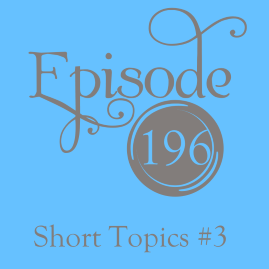
Charlotte Mason’s method of education impacts our lives on many levels. This episode of short topics includes ideas for collections from our physical world, ideas for getting more out of books beyond the usual narration that expands our intellectual world, and some of the many, many benefits we who use her method have in common with others that we would not have shared before to widen our social world.
Listen Now:

School Education (Volume 3), Chapter XVI, pp. 174-180

“To make collections of wild flowers for the several months, press them, and mount them neatly on squares of cartridge paper, with the English name, habitat, and date of finding of each, affords much happy occupation and, at the same time, much useful training: better still is it to accustom children to make careful brush drawings of the flowers that interest them, of the whole plant where possible.” (1/52)
“To make collections of leaves and flowers, pressed and mounted, and arranged according to their form, affords much pleasure, and, what is better, valuable training in the noticing of differences and resemblances. Patterns for this sort of classification of leaves and flowers will be found in every little book of elementary botany.” (1/63-64)
“I would not teach them any botany which should necessitate the pulling of flowers to bits ; much less should they be permitted to injure or destroy any (not noxious) form of animal life.” (1/62)
“Neatness is akin to order, but is not quite the same thing: it implies not only ‘a place for everything, and everything in its place,’ but everything in a suitable place, so as to produce a good effect ; in fact, taste comes into play.” (1/130)
“This, of getting ideas out of them, is by no means all we must do with books. ‘In all labour there is profit,’ at any rate in some labour ; and the labour of thought is what his book must induce in the child. He must generalise, classify, infer, judge, visualise, discriminate, labour in one way or another, with that capable mind of his, until the substance of his book is assimilated or rejected, according as he shall determine ; for the determination rests with him and not with his teacher.” (3/179)
“There is much difference between intelligent reading, which the pupil should do in silence, and a mere parrot-like cramming up of contents; and it is not a bad test of education to be able to give the points of a description, the sequence of a series of incidents, the links in a chain of argument, correctly, after a single careful reading.” (3/180)
“This is only one way to use books: others are to enumerate the statements in a given paragraph or chapter; to analyse a chapter, to divide it into paragraphs under proper headings, to tabulate and classify series ; to trace cause to consequence and consequence to cause; to discern character and perceive how character and circumstance interact ; to get lessons of life and conduct, or the living knowledge which makes for science, out of books ; all this is possible for school boys and girls, and until they have begun to use books for themselve.s in such ways, they can hardly be said to have begun their education.” (3/180)


I was so moved by this episode! All the wonderful knowledge you ladies are always eager to share with us, the fruits of your labor (and we know it’s intense labor!)
I’m so thankful for you and all your work! And all those things CM homeschoolers have in common that Nicole talked about made me appreciate this education even more! How many of those moments of seeing my kids talking to their fiends about exams, Swedish Drill, a favorite composer or artist, or the latest happening on their history spine, I treasure in my heart!